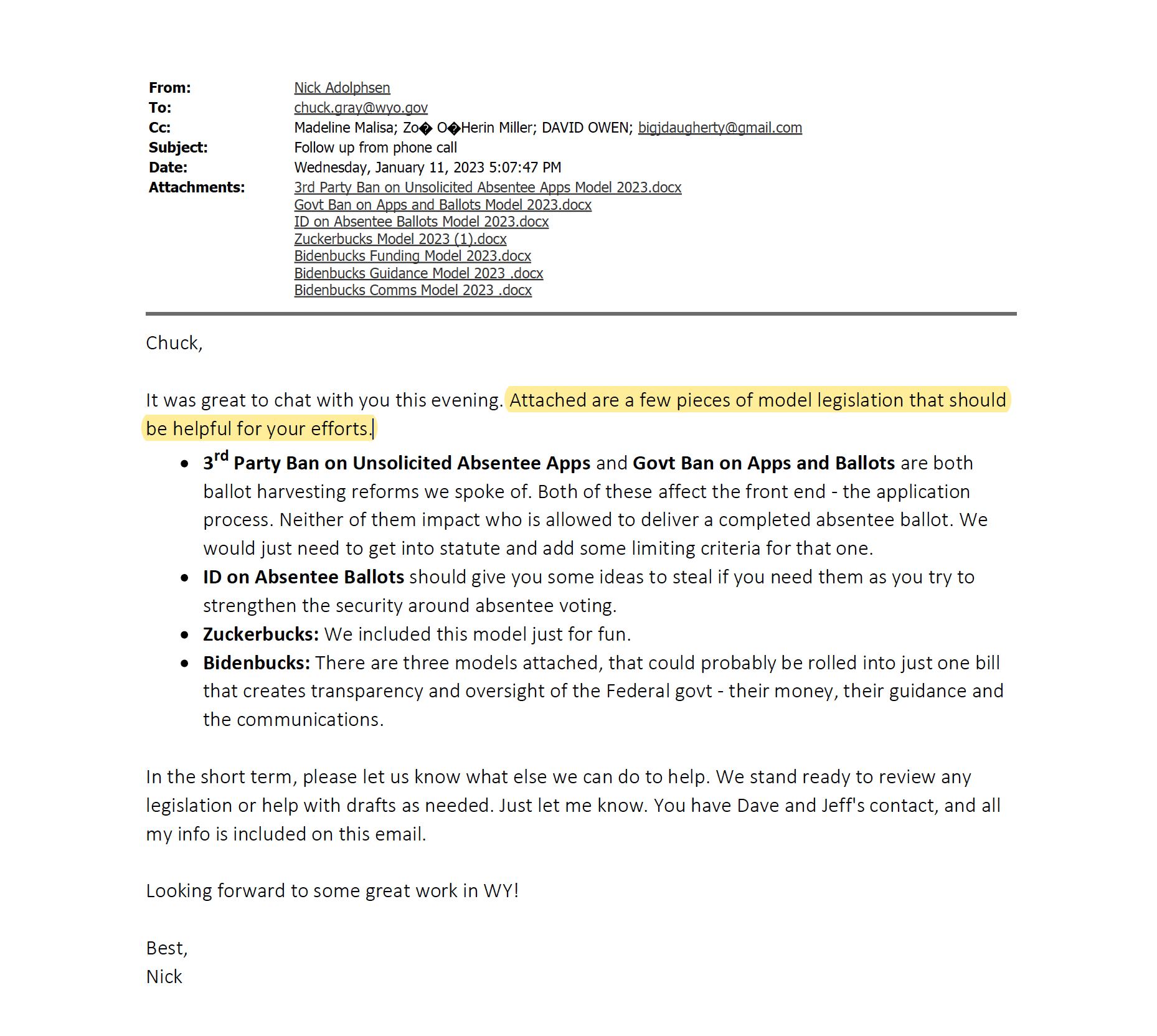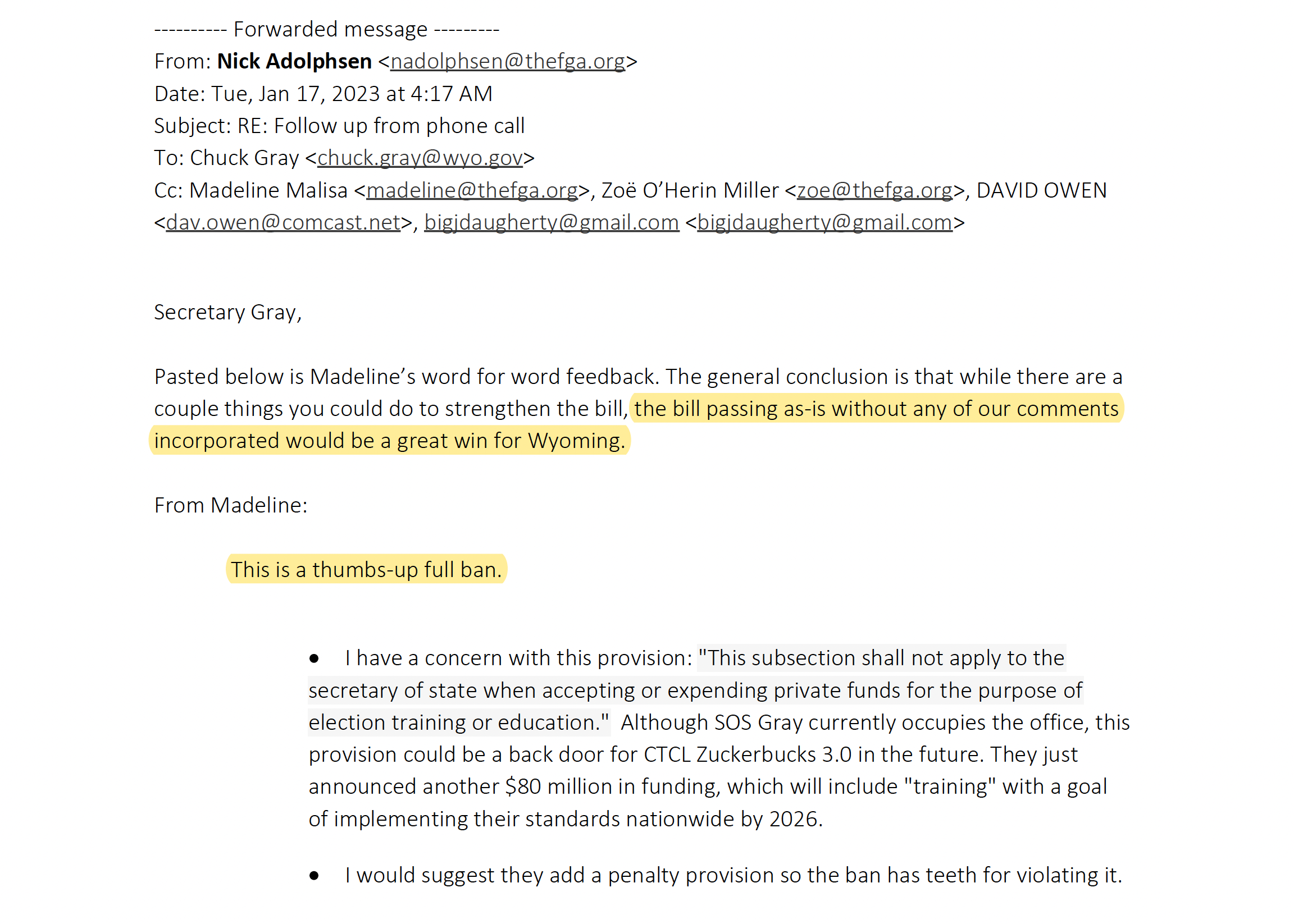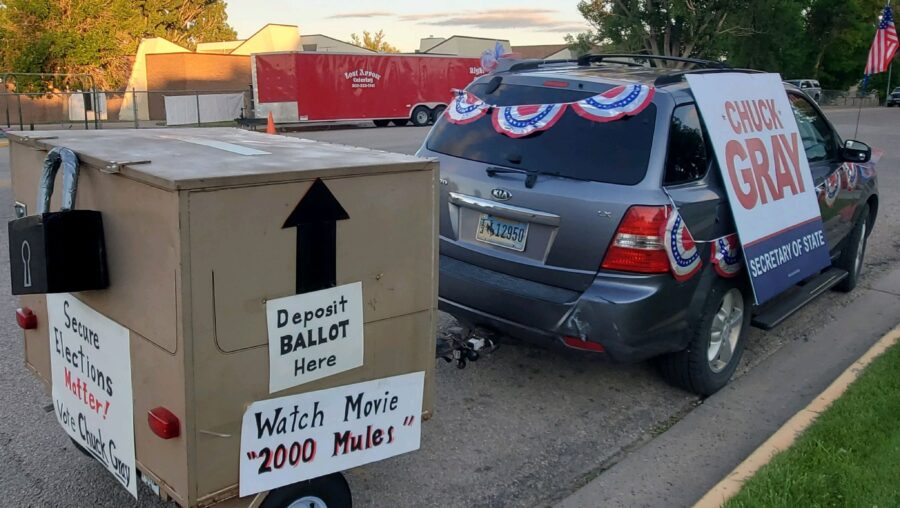A right-wing think tank in Florida put its thumb on the scales of Wyoming’s election reform efforts, an investigation by the Center for Media and Democracy (CMD) reveals.
Emails obtained by CMD show that the Foundation for Government Accountability (FGA), based in Naples, Florida, has had extensive communication with Wyoming’s secretary of state in its pursuit of severely curtailing voting access across the country.
Secretary of State Chuck Gray drafted and pushed several bills based on FGA’s priorities without ever publicly disclosing those email exchanges or his reliance on the billionaire-backed out-of-state group’s model language.
FGA is just one of many right-wing nonprofits homing in on putative election reform measures since the 2020 election. It has also worked to implement other reactionary measures in states across the country, including rolling back regulations on child labor and restricting access to food stamps. It is funded by billionaires such as Wisconsin-based GOP megadonor Richard Uihlein, along with the Bradley Foundation, the Sarah Scaife Foundation, and others.
Pushing Model Legislation
Emails obtained and reviewed by CMD reveal the extent of FGA’s access to and influence on Gray, Wyoming’s top official responsible for providing election oversight.
Since taking office in January 2023, the secretary of state has had significant communications with FGA.
“Attached are a few pieces of model legislation that should be helpful for your efforts,” wrote Nicholas Adolphsen, FGA’s state government affairs director, nine days after Gray was sworn in.

As the first election denier in the country to be elected as a secretary of state, Gray was a prime target for FGA. During his 2022 run for office, he claimed that the 2020 election was “clearly rigged” and his campaign hosted screenings of 2,000 Mules, the debunked 2022 documentary purporting to reveal a conspiracy by the Democratic Party to steal the presidential election using ballot drop boxes. (The film has since been pulled from distribution following a defamation lawsuit.) Gray positioned himself as an “election integrity champion” and highlighted his previous work as a state representative tightening voter ID restrictions. In 2021 he made a point of visiting Arizona’s partisan audit of the 2020 election results — which failed to find any evidence to support the conspiracy theory of widespread voter fraud — calling the operation “incredible” and “very important.”
In his January 11th email to Gray, Adolphsen attached the following seven model bills targeting election reform:
- Prohibition on the Delivery of Unsolicited Ballot Applications by Third Parties
- Prohibition on the Delivery of Unsolicited Ballots
- Act to Require Identification on Absentee Ballots
- An Act to Prohibit the Private Funding of Elections
- State Oversight of Election Funding Act
- Unlawful Federalization of Elections Act
- Federal Election Communications Transparency Act
He also mentioned that he included a model bill on “Zuckerbucks” — the Right’s code word for private spending on elections — “just for fun.”
During the 2020 presidential election, Meta CEO Mark Zuckerburg and his wife collectively donated at least $400 million to two nonpartisan nonprofit organizations to help government election offices across the country adopt new accommodations needed during the pandemic — a fact the Right widely misrepresented as pumping “Zuckerbucks” into the process in order to favor a Biden victory.
“Thanks Nick — working on these bills — it was great talking with you!” Gray wrote the next day.
Targeting Zuckerbucks
Despite Adolphsen having included the Zuckerbucks bill “just for fun,” it appears to have appealed to Gray. A few days later, he solicited input from Adolphsen on his draft of a similar bill for Wyoming, which was nearly word-for-word the same as the model.
Adolphsen responded that although FGA had a few recommendations on how it could be strengthened, “the bill passing as-is without any of our comments incorporated would be a great win for Wyoming.”

“This is a thumbs-up full ban,” another FGA staff member chimed in. “I would suggest they add a penalty provision so the ban has teeth for violating it,” that person added.
Gray forwarded the draft legislation and FGA’s comments to State Representative Daniel Singh (R–61), who ended up sponsoring the bill. The final version (HB 224) as introduced in the statehouse included the suggested felony penalty and adheres to the FGA model nearly word-for-word. The bill got carried over to the 2024 legislative session but died in committee.
A freshman representative at the time, Singh is now running for his second term and has since introduced legislation to ban sanctuary cities and counties and secured the endorsement of the Koch-aligned Americans for Prosperity in his 2024 reelection bid.
A Foiled Attempt to Stymie Absentee Ballot Requests
“The Governor just vetoed the absentee ballot request form bill. Very troubling,” Gray wrote to Adolphsen in March 2023. He also issued a press release and tweeted about his displeasure with the governor’s decision.
In January, Adolphsen had sent Gray a model bill on the measure — with the same title and intent as the final version (SF 131) passed in the House, where it had been cosponsored by Representative Singh.
In announcing his veto, Governor Mark Gordon (R) noted that the bill, as written, was “superfluous and potentially confusing.”
After Gray provided testimony in favor of the bill, state senators questioned the reasoning behind the legislation.
“Why is this a problem? What’s the substantive risk to the integrity of the election?” one senator asked. Failing to respond with a coherent answer, Gray simply referred to it as a “fascinating question.”
“Moreover, in its current form, the bill might provide a means to inappropriately suppress proper absentee voting,” the governor wrote.
Adolphsen was clearly frustrated by the veto.
“So he is saying that misleading documents that create confusion for voters and that claim to be official even though they are not official doesn’t [sic] affect elections. That lying and confusion doesn’t diminishes [sic] people’s confidence in the security of their elections? That’s some tough logic,” Adolphsen wrote. The exchange was first reported by CNN.
Neither Gray nor the legislative sponsors disclosed that any of their bills were based on FGA model legislation.
Absentee Voter ID and Ballot Drop Boxes
Gray also took an active interest in a bill that would have required Wyoming voters to provide one of three forms of identification when submitting an absentee ballot.
“This really doesn’t quite get to voter ID for absentee ballots,” he wrote to FGA, “but [I] was wondering if you could review this bill draft for me and let me know what you think.”
“Chuck, This bill actually looks really good,” Adolphsen wrote. “It doesn’t require a copy of the actual ID, but it does require enough information that it would make the ballots far more difficult to falsify.”
Other recipients of the email exchanges between Gray and FGA include Madeline Malisa, a senior fellow at FGA; Zoë O’Herin Miller, a former director at the Texas Public Policy Foundation, a major fossil fuel advocate; and two public relations professionals.
The bill, HB 251, was dead on arrival at the statehouse.
After the end of the legislative session, Adolphsen wrote: “Looking forward to getting together sometime soon to see how we can help you with your election reform efforts in WY over the next 18 months.”
Since these communications, Gray has sought to eliminate ballot drop boxes, a priority of FGA. Although he was not provided any model legislation on the subject, he sent a letter to Wyoming county clerks in June arguing that the use of drop boxes is neither safe nor secure, mirroring the language used by FGA and other groups.
The Foundation for Government Accountability is just one agent in a broader right-wing voter suppression effort. Cleta Mitchell, called one of the “chief architects” of this effort, has worked in collaboration with FGA and Leonard Leo’s Honest Elections Project (HEP) to spread unsubstantiated claims of widespread voter fraud and propose drastic legal measures designed to restrict access to voting. HEP has effectively become the outsourced bill mill of the American Legislative Exchange Council (ALEC), which has hosted at least three voter suppression summits with HEP for its lawmakers. FGA also has close ties with ALEC.
Sign up for our biweekly newsletter to stay updated with our latest work!



Leave a Reply